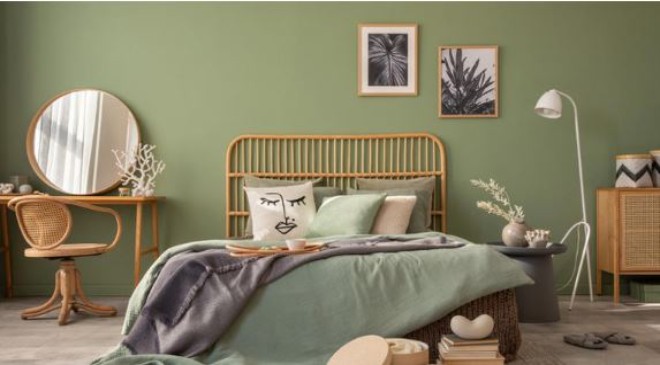Feng shui is an ancient Chinese practice that focuses on the flow of life force energy and means “the way of the wind and water.” The practice is used to arrange everything from buildings to objects to furniture in a way that achieves harmony and balance. Feng shui is focused on five elements: water, wood, earth, fire, and metal. Those who practice believe that combining and mixing these elements in the right way can improve everything from health to relationships–and even bring a bit of luck. Here are some ways to apply feng shui to your bedroom and create a peaceful, relaxing environment.
Read More : Donald Trump Gets Good News From the Supreme Court
1. Focus on the Bed
Your bed is the most prominent and important part of your bedroom. Feng shui calls for the bed to be placed where a solid wall is behind it. In addition, your bed should be in a part of the room where you can see the door, yet you aren’t directly in line of it. By doing so, this helps you feel protected and in command of the space. If possible, avoid blocking your bedroom windows with your bed.
If your bed doesn’t currently have a headboard, consider investing in one or even making your own. Having a headboard can help you feel more stable and relaxed. Make sure you wash your linens and comforter regularly and replace them when needed to promote a feeling of freshness.
Read More : 10 Best Places You Can Travel Alone That Are First-Time Friendly
2. Find Balance
When arranging furniture and decorating your bedroom, focus on balance. Think in terms of twos, meaning a pair of nightstands on each side of the bed or two reading lamps. If you have a second piece of large furniture besides your bed, such as a reading chair or large dresser, balance it out with a large floor plant or a standing mirror. However, don’t go overboard as feng shui is also rooted in minimalism.
3. Avoid Clutter
Speaking of minimalism, having clutter in the bedroom can lead to a feeling of stress and can disrupt the room’s positive energy. Make sure everything has a place, whether it’s a piece of clothing, jewelry, or your purse or gym bag. And don’t just throw it under the bed, in a drawer, or in the closet to get it out of the way. Instead, take the time to make a space for each item you bring into the bedroom, whether it’s in a drawer, cabinet, or storage bin.
Read More : Obama Sends Chilling Warning To Joe Biden
4. Incorporate Peaceful Colors
When considering colors for the bedroom, lean into hues and patterns that promote restfulness, as opposed to those that are bold and stimulating. Think neutral, earthy tones such as beiges or whites. Healing colors such as blues and greens can also work, as long as they aren’t too bold. Avoid bright colors — such as oranges and hot pink — which may cause problems when it comes time to sleep. To add pops of color, try adding some lucky plants to the bedroom.
5. Remove Technology and Work Areas
To promote relaxation, remove any technology and keep work areas out of the bedroom if possible. Televisions, computers, smartphones and tablets bring artificial energy to the environment, along with light and sound to the room when it should be dark and quiet.
In addition, mixing work and rest isn’t part of feng shui. If you can avoid it, leave work out of the bedroom so you’re not tempted to get up and start working when you should be resting.
Read More : 5 Tips To Calm Your Nervous System When You’re Stressed
6. Find the Right Spot for the Mirror
Don’t place a bedroom mirror right in line with the bed. There’s a superstition that says while you’re sleeping, your spirit can leave your body and go into the mirror and not return. Instead, feng shui calls for you to position a mirror so it is a bit offset from the bed. Also, make sure the mirror is hung in a way that nothing is cut off when you gaze into it.
7. Don’t Forget Lighting
Read More : Watch how the iPhone 15 handles the bend test that busted the Pro Max
Too much or too little light can disrupt the feng shui of a room. Since light is part of the fire element, make sure you have just the right amount to create a calming, restful space. Use blinds or curtains to help control the natural light. Fixtures that can be dimmed will help bring the right amount of light depending on the need.









































